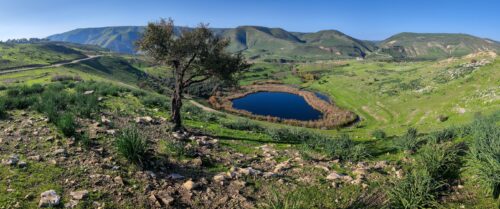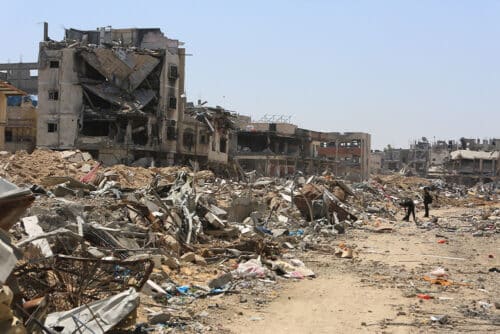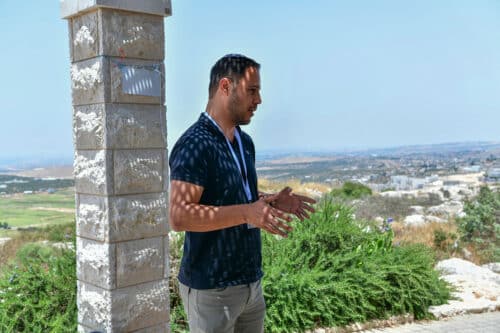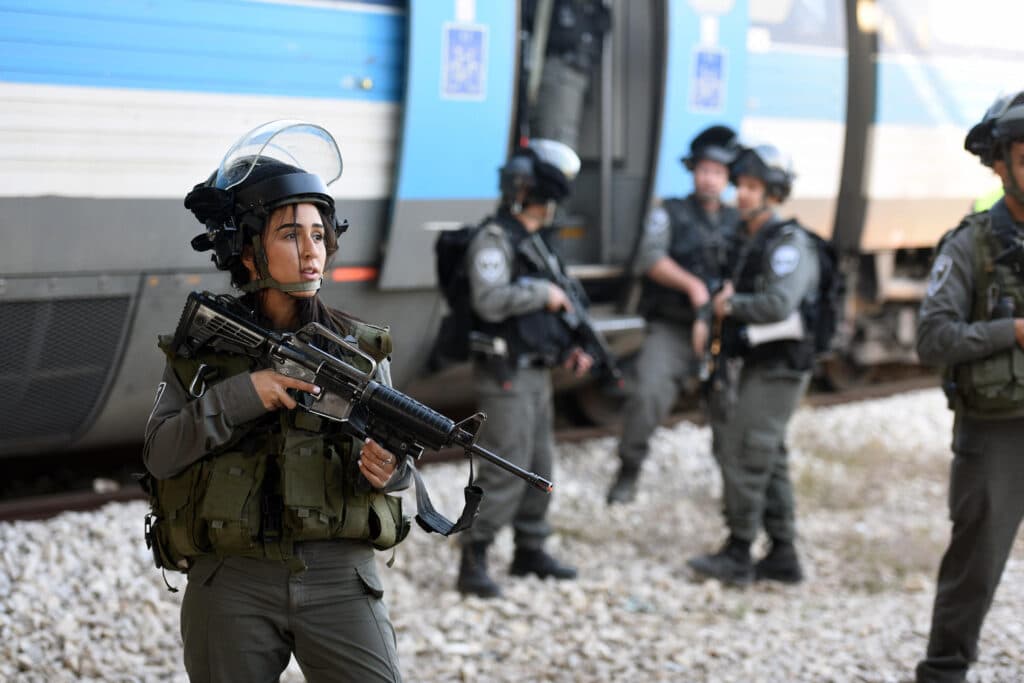
On Saturday morning, October 7, the last day of the Jewish holiday of Sukkot when thousands of terrorists breached the parameter fence around the Gaza Strip and broke into the Gaza envelope communities – they encountered probably the last thing they expected – police men and women of the Israel Police. These police officers, whose daily jobs encompass traffic enforcement, investigations of criminal activity, and handling civilian complaints, found themselves unexpectedly at the forefront of a war against terrorists, armed only with their personal side arms, risking their lives to stem a massive flow of terrorist armed to the teeth with automatic rifles, hand grenades and RPGs.
“Policemen and policewomen alike – ran into the fire without hesitation, risked their lives fighting the terrorists and contained their advance towards additional communities in the area”, says retired Sub-Superintendent Lieutenant Colonel (res.) Uri Engelhard, member of the IDSF HaBithonistim movement. “Police officers, who are not so young anymore and hardly participate in firearm and physical training, demonstrated unbelievable courage under fire. At their side, the brave fighters of the Special Operations Units, the Special Undercover Unit, the Special Patrol Unit and the Border Police – all who ran headfirst to the fighting in all arenas. The police leadership commanded in an effective level-headed manner, delegated command to fighters in the field and led by example and with remarkable determination”.
However, it is exactly those inspiring moments, when the Israel Police spearheaded the battle against the thousands of terrorists, that brings into the limelight the paradox with which the organization has to contend these days: it is the last organization that can be the target of accusations regarding the systemic failure that led to the October 7 massacre, yet it has to contend with difficult and complex issues of national security that far exceed the accepted scope of police work – this without the required tools and resources. This is a state of affairs that Engelhard, who has a rich past in Israel’s national security establishment as well as with international high-tech companies – seeks to change.
High-Tech, law and this week’s Torah portion
As one who had a prolific career in the high-tech industry, served in the IDF operational technology units, and headed successful technology firms – Engelhard’s decision to join the police force at the height of the second Intifada raised quite a few eyebrows.
“I felt it was a mission of a Zionism”, he explains. “I saw that the Police not only suffered from a severe shortage of officers and personnel, but also from poor communications systems, insufficient computer systems and the lack of advanced technologies – all this in a time when Israel was under a horrible deluge of terror attacks, which claimed a large number of victims and sewed fear in the hearts of Israel’s civilians”.
Thus, Engelhard chose to leave a promising and lucrative career behind and step up to the flag to lead a technological revolution in the Israel Police. He established the technology administration in the Police, now a technology division, which he currently heads. Through this division, Engelhard unified all of the Police’s technology activity, that was decentralized and suffered from a lack of a central coordinating body, and marched the entire organization into the 21st century. This was done by successfully implementing over one hundred large and complex simultaneous technology projects, Maj. Gen. Yitzhak (Khaki) Harel, Head of the IDF ICT Directorate, referred to this overhaul in the Israel Police in 2003: “Take for example the technological revolution in the Israel Police – this is something of which I could only dream”.
I’ve rejected out of hand more than a few very attractive offers from leading companies to be part of the sale of amazing proprietary technologies we’ve developed at the Police to foreign states
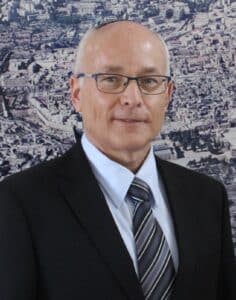
After retiring from the police, did you – like many former senior members of the defense establishment – capitalize on your expertise in security technologies abroad?
“Absolutely not. I’ve rejected out of hand more than a few very attractive offers from leading companies to be part – even passively – of the sale of amazing proprietary technologies we’ve developed at the Police to foreign states. I strongly opposed this, among other reasons, because these technologies make their way into the hands of Israel’s enemies and directly hurt Israel. Israel’s Department of Production and Procurement in the Defense Ministry must establish a new policy on this matter”.
Rather, Engelhard decided to seek his fortune elsewhere and pursued a life-long dream – to become an attorney and notary dealing in intergenerational transference, i.e. wills, estates and durable power of attorney. In stark contrast to his former positions, where he managed thousands of employees and budgets in the billions of shekels, here he can take a personal approach to help people, and deal with issues pertinent to their future. “I feel a sense of purpose with every case I conclude successfully”’ he says. Since the October 7 attack, he has been helping, among others, in dealing with the digital assets left behind by the casualties of the Gaza War.
In addition to serving on various boards of directors, Engelhard taught management and decision making at the Tel-Aviv University. His experience led him to write “The Secrets of Management in The Torah Weekly Portion”, which sought to fill a void in the area of management in the academia, which exclusively relies on foreign speakers, and shed light on management principles that can be found in the most ancient book the Jewish people gave the world – the bible.
The Jewish and Zionistic ideological motivation for Engelhard throughout his professional career propelled him to join the IDSF HaBithonistim movement. “Through research, connections in the government, media and education, the Movement is able to contribute to the advancement of the Jewish nation’s liberty and sovereignty in its land, for generations to come”, he says. “Joining the Movement adds meaning to my life, as a partner – albeit one with a small role – to the strengthening of Israel’s national security”.
The complexity of the national security challenge
Engelhard’s rich and unique background, that spans the fields of management security, technology, law and Judaism, affords him a perspective that is multi-dimensional, fresh, and original, and allows him to offer out-of-the-box solutions, that are not restricted by the normative paradigms in the world of policing.
“National security is not measured only in the context of wars against other countries and terror”, he stresses. “It includes the security of the individual, economy and industry. The Police deals with criminal and security threats in tandem: from the war on accidents – which had caused Israel more casualties since its establishment than all its wars put together – through the rife agricultural crime that is threatening national security – to the elimination of organized crime, that costs billions in damages each year”.
The fact that Israel’s national security spans many varied areas and places immense responsibility on the shoulders of Israel Police that stretcher way beyond its capabilities and resources. The most prominent example is the war against the assassinations in the Arab society, which have ballooned into a national security threat for all intents and purposes.
“The Israel Police has excellent officers and commanders”, explains Engelhard, “who do their duty with a sense of purpose, for the people and the State of Israel. These police men and women labor around the clock without extra pay for their significant overtime, with thankless work, come sun or rain, while having to contend with harsh scenes. The force has people who’ve developed incredible technologies that have won international awards; however, the police force is way too small to deal with the magnitude of missions with which it is tasked. And at the end of the day, it is the Israel Police that has to contend with Israel’s systemic shortfalls; When the welfare system fails to do its job in helping the needy, when the Transportation Ministry’s Road maintenance is poor, when security forces fail to identify a terrorist – it all funnels down to the Israel Police, which finds itself out of its traditional policing depth”.
The solution: reenforcing the blue police and the border patrol
Engelhard proposes a list of practical solutions that could reinforce the Police and enable it to carry out its complex tasks to their fullest. “The key here is a bigger budget and human resources”, he asserts. “Any bill or massive development plan that lay extra work loads on the police must be conditioned on additional job placements and the additional budget their enforcement and execution demand”.
For the Israel Police to be able to respond to the growing challenges it is facing, says Engelhard, it needs young blood. For this end, he suggests a reform in the ranks of mandatory service police i.e. military recruits who are sent to serve in blue uniforms instead of the IDF.
What would you do to change the existing state of affairs, where mandatory service police comprises mainly recruits that the IDF is willing to transfer to Israel Police just to become dispatchers or patrol officers?
“The number of 18-year-old recruits in the police should be increased dramatically”, he explains. “The Police should be able to select its candidates, rather than being dependent on the recruits the IDF sends it, and allow new recruits to choose themselves whether they prefer to serve in the blue police, the border patrol – or even in the IDF. Quality mandatory police officers who serve in the police’s various units would markedly improve the operational performance of the Israel Police”.
In addition, Engelhard believes that Israel Police should reenforce itself with retired policemen and policewomen, who can greatly contribute to the organization with their knowledge, experience and soaring motivation.
“With that said”, Engelhard stresses, “a state of ongoing preparedness should be ensured for all members of the police force to face the enemy, ensuring that each policeman and policewoman be at a sufficient combat level. This requires more training, advanced equipment, and technological means and abilities currently only in the hands of the General Security Service, and better preparedness for emergency situations. The commanding spirit that should pervade all ranks of the police is that of integrity, professionalism, and commitment to the mission. This is the ethos that should be the guiding principle for the organization”.
The changes proposed by Engelhard are not aimed at the Israel Police alone. “The Israel Border Patrol needs a significant boost to its ranks, an upgrade of equipment and systems, and it must be present in every single spark point with the Arab population”, he claims. “The Border Patrol is the most professionally skilled force for security policing, and it should spearhead the effort to ensure ongoing security, thereby freeing the IDF’s other units to focus on their main purpose, which is to be prepared to respond to any attack and vanquish the enemy”.
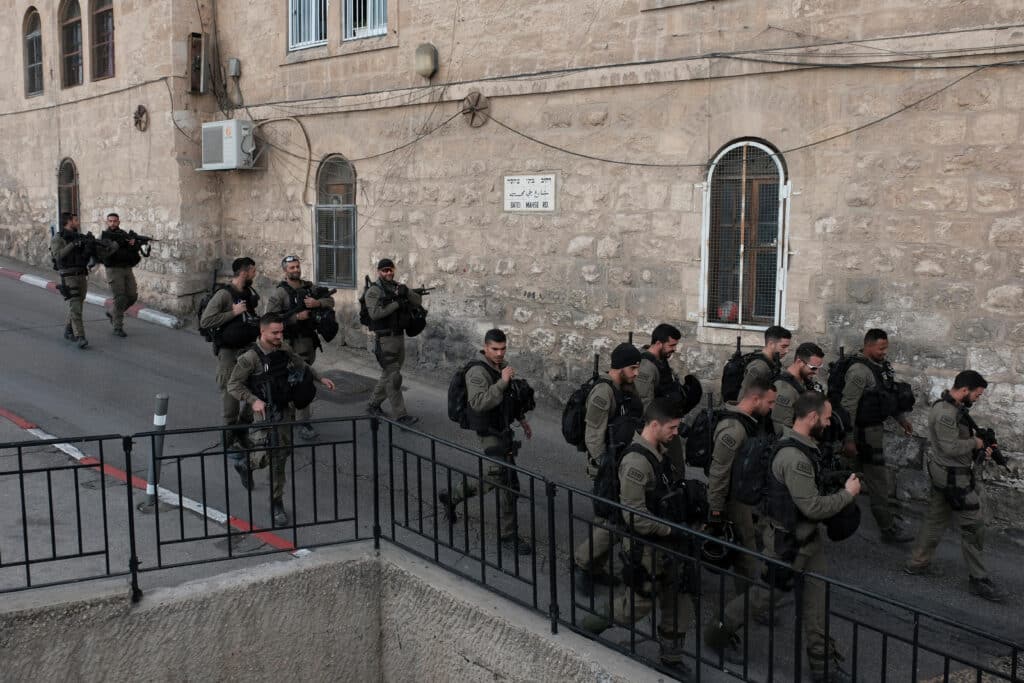
From Reaction to Initiative
The plan presented by Engelhard for the reinforcement of the Israel Police and its ability to deal with criminal and security challenges is in fact part of a deep and comprehensive perceptional overhaul, that aims to take the Israel Police from an organization that is caught up in a race of trouble shooting to one that is charged with the long-term responsibility over the national security of Israel.
What should Israel do to ensure its ability to deal with threats on many fronts at the same time?
“Israel’s leadership must do what it takes to ensure the existence of a thriving nation in the Land of Israel for posterity and eliminate any emerging threat – from within and without the country, and not put on hold what must be done today just for the sake of an appearance of quiet”.
Among the steps that would affect this change, Engelhard mentions the formulation of a relevant national security strategy, based among others on a change of the response doctrine to initiative, and on the acknowledgement of the enemy’s proven capabilities and not on its posited intentions; the encouragement of social values like military enlistment and the ethos of “a nation which is a front”; and an educational and ideological reform that reenforces the commitment to the group over individualism and will instill the spiritual, Zionist and cultural values that unify us as a nation.
“Rather of espousing a diaspora Jewish attitude of appeasement, Israel must adopt a Zionist mentality – acting in a spirit of proud nationalism such that exercises Israel’s sovereignty”, says Engelhard. “Instead of always being reactive, Israel must initiate. This is the only way it can stronghold its national security for future generations and ensure that another October 7 can ever occur once more”.


